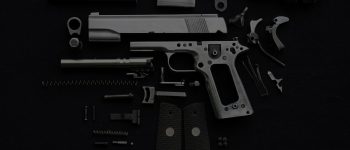Insider Tips > Service & Pricing Advice
Service & Pricing Tips
Your hourly charge will depend upon your proficiency and what type of work you are offering.
Skip Walters

Generally, a good rule is to make certain that any work you take in, is not beyond your level of proficiency. The gunsmithing business is not one which grows through conventional advertising. It is grown through “word of mouth.” With that being said, it can be destroyed in the same way. All that is needed is a few unhappy customers to start talking at the range or hunting club about their dissatisfaction with your work and word will travel quickly.
The first rule is not to work on anything at the counter, in front of the customer. After checking to be certain the weapon is not loaded, take it back to your workbench for an examination. Give the customer something to read while they wait or otherwise keep them occupied. It is disastrous to start disassembly of their Grandpa’s gun and have an errant spring fly off and get lost. Likewise, if you are not familiar with the reassembly combination of the firearm, you may need to use reference materials to facilitate reassembly. It is much better if the customer doesn’t see you frantically paging through exploded diagrams as you try to reassemble the gun in a hurry. If they do, people will hear about it.
Suppose the customer leaves the gun and you repair it. If the repair was a mechanical issue, test fire it. There may be more than one problem. If you return the gun and it still doesn’t work, you can be sure the customer will tell others… even if the first problem has been repaired.
Many customers will tell you, “There’s no rush, take your time.” Don’t be fooled. They will call you within a week for a “status” on their gun. To avoid this annoying situation, tell them an approximate time frame as well as a cost, and that you will call when the work is completed. In many cases, it is best to call and give them an update when the time frame given is approaching. If you don’t do this, customers will be calling daily and you will be spending more time on the phone than at your workbench. Some will call anyway, so be polite and repeat to them that you will call when the work is complete and ready for pick up. Eventually, they get the message and stop calling daily.
Pricing is a subject that vexes most gunsmiths. People will spend over $120 per hour to have their car repaired or $250 for a veterinarian to look at their cat for 15 minutes. These same people don’t want to spend more than $25 to have their gun fixed…. while they wait. Avoid these customers. You don’t need them and they will never be satisfied. To eliminate these people, institute a minimum bench charge. I have a $40 minimum. This is the minimum charge for any work that must go through the ATF record. That is any gun that you must take possession of and have responsibility for safeguarding during repair. For example, to mount a scope on a rifle that is already drilled and tapped for mounts, $25 is a reasonable charge for mounting and boresighting. This can be done while the customer waits, hence the gun need not be entered into your ATF records and you never take full possession of the gun.
Your hourly charge will depend upon your proficiency and what type of work you are offering. A reasonable rate is $75 per man hour and $100 per man and machine hour. For instance, to completely tear down and detail clean a weapon, it should take about an hour. To properly barrel, chamber and headspace a Mauser on a lathe should take nearly 2 hours. Thus, labor costs of $75 to detail clean and just shy of $200 to barrel and chamber. The added expense pays for the tooling, machine maintenance and power to run the machine. These costs will increase over time, but the principles will stay the same.
The gunsmiths that have been most successful have specialized in a niche area. Many have begun internet businesses and manufacture entire guns or just accessories for a given type of weapon. Some cater to military and law enforcement. Others build safari rifles for wealthy clients. Some work for large companies in a corporate environment. All of them started the same way. They had a desire to do something with what they had been given and sought to develop a skill that few could master.




